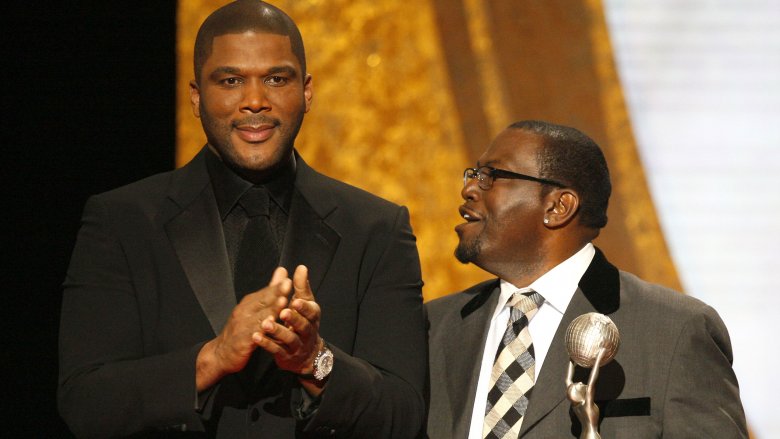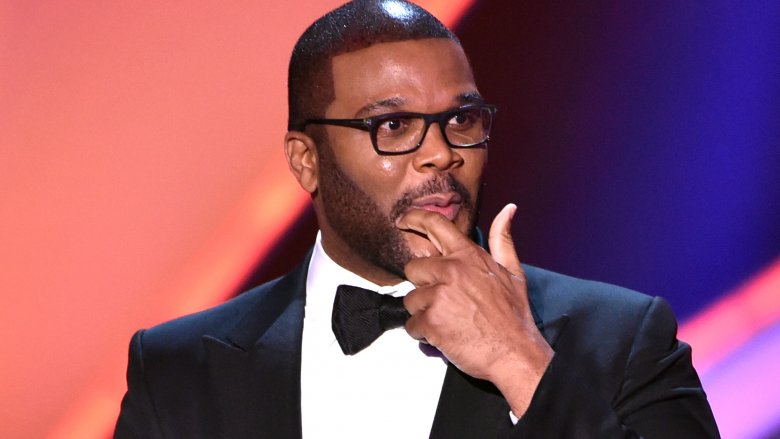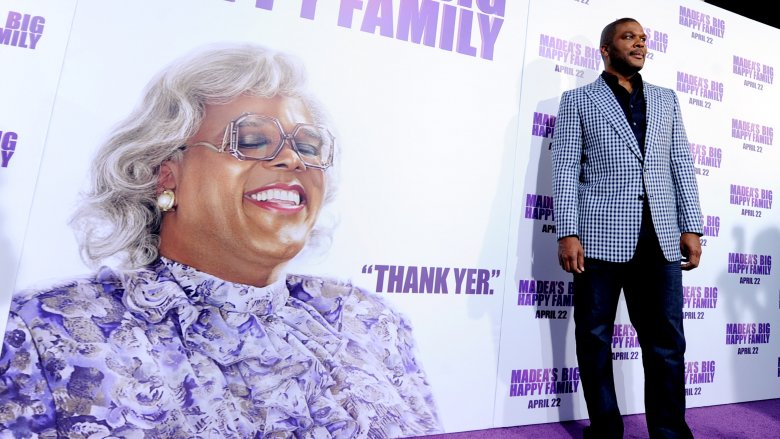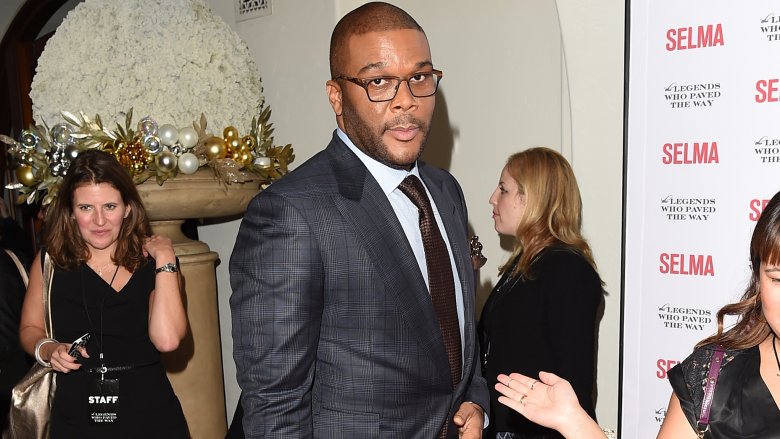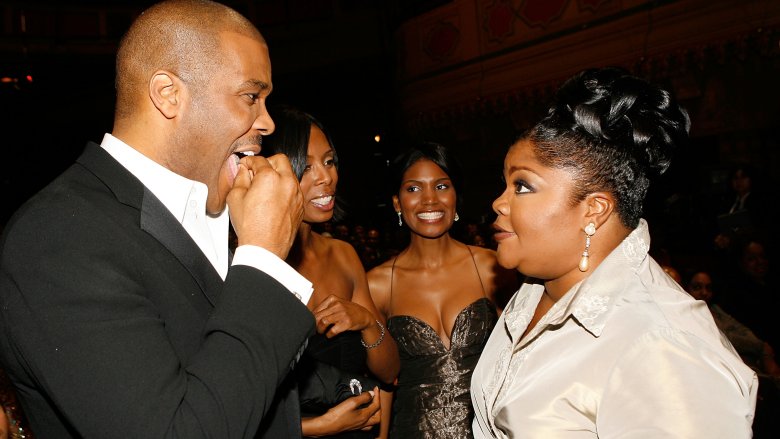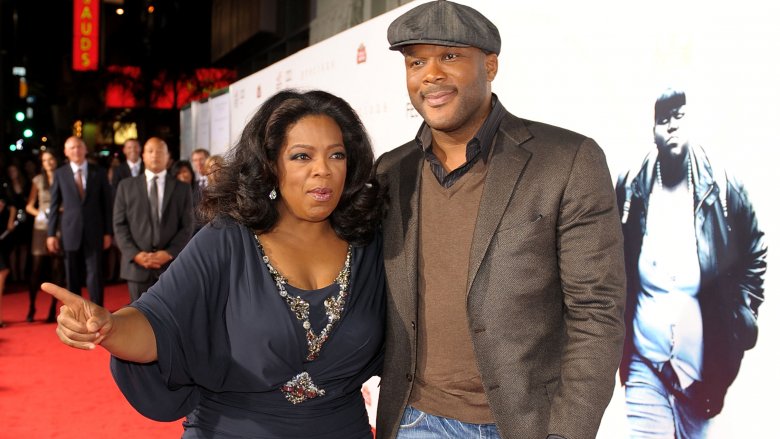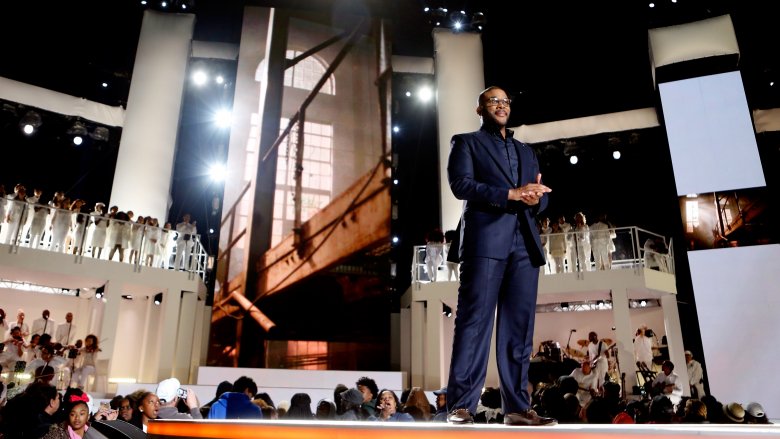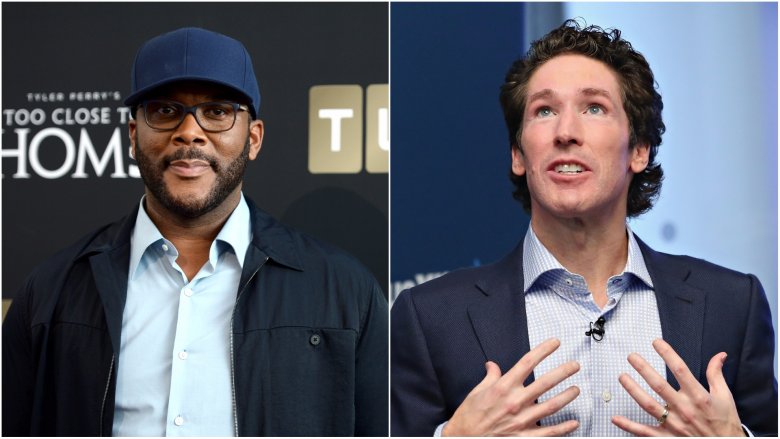The Shady Side Of Tyler Perry
There is no question that Tyler Perry is a prominent player in the entertainment industry who worked his way to the top after taking the Atlanta theater community by storm and becoming a box-office champ with his Madea series and gospel-based films. He gave audiences something Hollywood had largely ignored—stories and characters aimed at the life experiences of the black community.
But like any successful figure, Perry is not without controversy, and over the years, he hasn't exactly handled those situations well. In some cases, he even doubled down on his questionable behavior. If the rumors are to be believed, Perry's ego grew so big that he even went toe-to-toe with Oprah, as in the Oprah Winfrey. Hey, it's not always easy to get ahead in Hollywood without pulling a few shady moves, and it seems Perry is no exception. Check it out.
He fired writers for trying to get union benefits
After striking it big at the box office, Perry set his sights on television, where he found success with the hit sitcom House of Payne (2006-), but just as Perry was preparing to sign a lucrative syndication deal and launch the spin-off Meet The Browns, Deadline dropped the "surprising" news that he fired four writers after they requested union contracts. The Writers Guild of America stepped in and charged Perry's production company with "unfair labor practice" and bargaining in "bad faith." It was not a good look.
"I feel like I was slapped in the face, like we were used," writer Teri Brown-Jackson told Deadline. "We were good enough to create over a hundred episodes, but now when it comes to reaping the benefits of the show being syndicated and having other spin-offs from it, he decides to let us go unless we accept a horrible offer."
Kellie Griffin, the head writer for House of Payne, said she wasn't going down without a fight. "While I'd like to see something positive come out of this for us, if this fight helps future black writers get what they deserve, that's a good thing."
As for Perry learning his lesson, he did make a change to the writers' room for his future shows—by not having one. Perry told ABC News he writes everything himself now.
Two unions banned actors from working with him
Perry's union troubles didn't involve just writers. In 2015, two actor unions banned its members from performing in Perry's stage play Madea on the Run because his production company wouldn't sign a union contract.
IndieWire reported why this boded poorly for Perry: "In brief, a union contract essentially lists the terms and conditions of employment for union members, as well as the employer's obligations and responsibilities. In this case, ultimately it's really there to protect the actors." the site said. "And Perry, in refusing to sign a contract, suggests, as it did in the case of the four writers above, that he doesn't want to have to be bound to any agreements that might eat into his profits from the show."
It seems like Perry's main concern is raking in the cash, which he does very well. mind you, but that doesn't mean everyone is thrilled with his methods.
He relies on stereotypes
Following the success of House of Payne and Meet the Browns (2009-12), NPR published an open letter to Perry from African-American journalist and cultural critic Jamilah Lemieux, who was proud of Perry's success, yet uncomfortable with his use of stereotypes that include "buffoonish, emasculated black men and crass, sassy black women."
"Your most famous character, [Madea], is a trash-talking, pistol-waving grandmother played by none other than you." Lemieux wrote. "Through her, the country has laughed at one of the most important members of the black community: Mother Dear, the beloved matriarch. I just can't quite get with seeing Mother Dear played by a 6-foot-3 man with prosthetic breasts flopping in the wind. Our mothers and grandmothers deserve much more than that. Heck, our fathers and grandfathers deserve more."
"Mr. Perry, you have told the Hollywood 'old guard' to kiss your backside, and I appreciate that, brother," she said. "But many black folks have expressed some of the very same attitudes about your work that white critics have."
One of those black folks Lemieux was referring to is acclaimed film director Spike Lee, who famously took Perry to task for his stereotypical characters. Perry was pissed...
He doesn't take criticism well
In an interview with 60 Minutes (via the New York Daily News), Perry fired back at Lee's claims that his shows are setting black people back to the days of Amos 'n' Andy.
"All these characters are bait—disarming, charming, make you laugh bait." Perry said. "I can slap Madea on something and talk about God, love, faith, forgiveness, family, any of those... It's attitudes like [Lee's] that make Hollywood think that these people do not exist and that's why there's no material speaking to them."
Perry was a lot less eloquent when he later told Hip Hollywood that the Oscar-winning Lee can "go to hell."
The Madea star continued to ignore criticism and reportedly began attributing any backlash to his character's weight, according to The Root. "When people were like, 'How dare you put fat black people on television, these are caricatures, these are stereotypes'—I was so offended because my aunt's fat. My mother's fat. My cousins are fat," Perry said. "People who are like, 'How dare you'... I would hear all these things, and I would go, 'Hmmm.'"
But The Root editor, Demetria Lucas D'Oyley, was not having it: "Does Perry live in the same insulated bubble as R. Kelly, the one that keeps him so isolated from reality that he genuinely has no clue why his critics don't like his work?" she wrote. "There might be, like, five people who care about the weight of Perry's characters."
His films use HIV as a questionable plot device
In 2014, Perry was called out by The Huffington Post for the controversial ending to Tyler Perry's Temptation. In the movie, an unfaithful wife contracts HIV after cheating on her husband, while the husband rebounds with a beautiful new wife and family.
"Either Perry believes that if you cheat on your partner, you deserve a terrible disease," said HuffPost writer Mike Ryan, "or he believes that the people he hopes will pay money to see Tyler Perry's Temptation believe that if you cheat on your spouse, you deserve a terrible disease. I can't decide which is worse."
Buzzfeed took it even further. Writer Louis Peitzman noted that at least three characters in Temptation have HIV. "How else to read the film, then, but as a condemnation of sin—and of those suffering from HIV? In the context of Temptation, it is very much a 'sinner's disease,' something that happens because a person did something morally wrong."
This wasn't the first time Perry used HIV as a plot device. "In For Colored Girls, he gave us Jo, played by Janet Jackson." Peitzman said. "She contracted HIV from her husband's infidelity with other men. I won't even go into the film's homophobia, another recurring issue in Perry's movies, but the basic idea is the same: Jo's husband gets HIV because he cheated on his wife. And Jo herself is apparently culpable, because she knew her husband was gay and chose to ignore it."
He allegedly blackballed Mo'Nique
After winning an Academy Award in 2010 for best supporting actress in the movie Precious, Mo'Nique's film career came to a screeching halt. According to The Hollywood Reporter, she was told by Precious Director Lee Daniels that she had been "blackballed" for refusing to "play the game" and campaign for her Oscar. She still won, but it allegedly cost her future roles in Daniels' films and others.
"Mo'nique is a creative force to be reckoned with," Daniels said. "Her demands through Precious were not always in line with the campaign. This soured her relationship with the Hollywood community. I consider her a friend. I have and will always think of her for parts that we can collaborate on. However, the consensus among the creative teams and powers thus far were to go another way with these roles."
What most people don't know is that the "creative teams and powers thus far" reportedly referred to Perry and to Oprah, who were both producers on Precious and worked closely with Daniels. In May 2017, Mo'Nique put all three on blast during a comedy set at the Apollo and took some creative liberties with the term "blackballed."
"I was not blackballed." she said (via HuffPost) "I was whiteballed by some black d**ks who have no balls. Thank you, Mr. Lee Daniels. Thank you, Mr. Tyler Perry. Thank you, Ms. Oprah Winfrey."
Yikes. Remind us not to mess with Mo'Nique.
He may have feuded with Oprah
In 2012, Perry left TBS for OWN, where he created three series for Oprah's network. At the time, it seemed like a perfect fit because the two had worked closely together for more than a decade. However, according to the Daily Mail, their relationship allegedly went south in 2016 over Perry's supposed inability to accept criticism. The situation reportedly grew especially heated when Oprah suggested Perry bring on writers after a focus group felt his scripts could be "improved significantly."
"That's when Oprah finally got to see a side of Tyler she hadn't experienced yet," a source told the tab. "He resisted her feedback, the same way he resists the feedback of critics and media people who chastise his work, and became extremely defensive with her. He told her, "Aren't the shows delivering ratings for the network? Well, then let me do what I do and you can keep your focus group research to yourself.'"
There was one small problem. Perry didn't leave TBS for OWN because his shows were so successful. He left because the ratings were tanking, and he allegedly refused to listen to network feedback, so TBS didn't renew his contract. In essence, Oprah bailed him out, but he was reportedly making the same mistakes all over again.
While Perry and Oprah's best friend, Gayle King, both denied reports of a feud, he inked a deal with Viacom in 2017 instead of extending his exclusive contract with OWN. It sure seems like something went down.
He has controversial ties to prosperity theology
Perry donated $1 million to T.D. Jakes' ministry in 2013 during a performative video that viewers called "everything from a disgusting sham to a powerful move of God," according to Urban Cusp.
One of Perry's critics was social and religious issues writer Candice Benbow, who is both a fan of Perry's work and Jakes' ministry. Benbow said she was deeply concerned about the practice of prosperity theology, where "poor and vulnerable" parishioners are encouraged to give money with promises of increased returns. "I believe we can't afford to miss the issue much larger than Perry and Jakes at work here," Benbow writes. "African-Americans lead in tithes and offerings, but also lead in being adversely affected by all socioeconomic disparities. The economic commodification of the Gospel has been peddled on Black people in a way that no other culture has experienced. And, seemingly, it happened again. Here—a man born into poverty, who rose to riches on messages of hope and faith, donates $1 million to a man who was born into poverty and rose to riches on messages of hope and faith. I can certainly understand folks' frustrations."
Perry seems to have largely ignored those who criticize his support of prosperity theology, and he made a big show of it following a natural disaster that caused a scandal for one of the movement's most prominent preachers.
He defended Joel Osteen after Hurricane Harvey
In the aftermath of Hurricane Harvey in Houston, Texas, televangelist Joel Osteen found himself under fire after reports emerged that his massive Lakewood Church had allegedly shut its doors to residents seeking shelter. While Osteen claims he was the victim of "misinformation," the news renewed the controversy surrounding prosperity theology, reported Buzzfeed.
Osteen's bad press soon began to blow over as Hurricane Irma set its sights on Florida, but headlines heated back up when Perry promised to donate $1 million to Hurricane Harvey relief efforts, included $250,000 specifically earmarked for Osteen's church.
"Let me tell you something: Joel and Victoria are amazing people," Perry said in a Facebook video (via Page Six). "There is no way they would lock people out of the church and not let people in for shelter. There were some safety concerns. I spoke to them on the phone, and it all made perfect sense to me so before you just run and judge somebody really quick, you need to know the whole circumstances."
According to Rolling Out, "Perry's choice to give back should be praised, but some are upset that he's giving to Osteen who many believe is only a prosperity preacher." The social media judge and jury had plenty to say. One Twitter user called it "a spit in the face of Harvey survivors. Celebs are so out of touch..."

